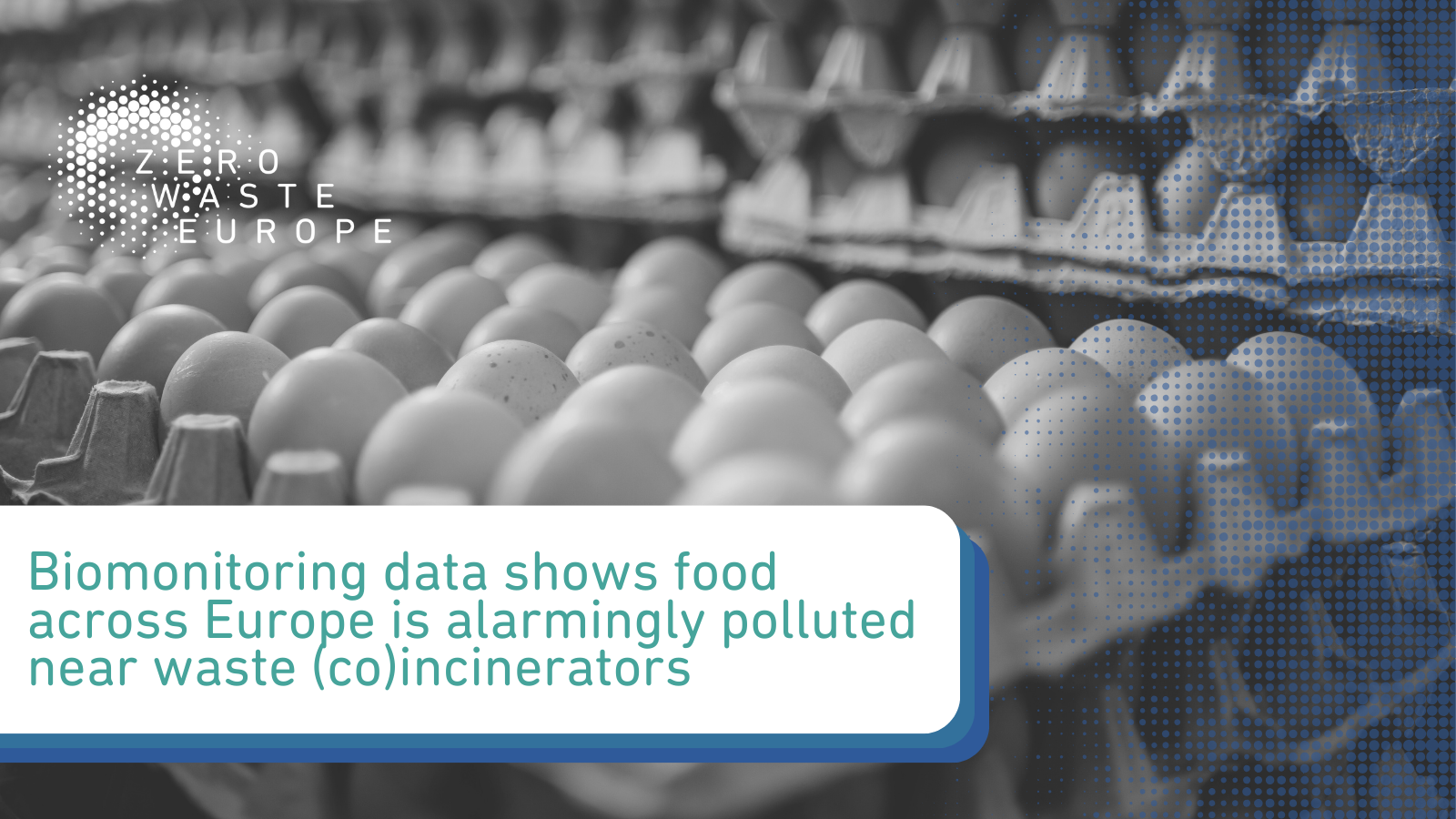Biomonitoring data shows food across Europe is alarmingly polluted near waste (co)incinerators

Brussels, 11 April 2024 – New evidence published by Zero Waste Europe and ToxicoWatch Foundation on biomonitoring research on waste (co)incinerator emissions in Slovakia and the Netherlands found high levels of persistent organic pollutants (POPs) in food near the facilities.
The two studies, part of Zero Waste Europe’s True Toxic Toll project, focus on Slovakia and The Netherlands. They analysed the presence of POPs in the surrounding environment of facilities. Specifically, the studies meticulously gathered samples—such as eggs from backyard chickens, vegetation, fruit, roof dust, water, and sediment—from the vicinity of the investigated facilities.
A facility in Turňa nad Bodvou, Slovakia, has revealed that eggs, pine needles, and mosses in the vicinity show significantly high concentrations of dioxins, and PFAS, commonly known as ‘forever chemicals.’ Notably, dioxin levels in eggs in Zádiel surpass EU limits by 300%. Of grave concern are the elevated levels of PFAS found in surface water streams near the cement kiln and sediment. Moss samples exhibit some of the highest recorded heavy metal levels in Europe.
Similarly, an investigation into the waste incinerator REC in Harlingen, The Netherlands, has revealed dioxin concentrations in eggs from backyard chickens surpassing the EU’s allowable limit by nearly 300% – just 2 km from the REC incinerator. Furthermore, PFOS concentrations in eggs from the same location exceeded the highest levels previously recorded in eggs in The Netherlands (38.4 nanogrammes per gramme of fat). The PFAS concentration in these egg yolks is comparable to levels found near the fluorochemical plant in Antwerp, with 11 different PFAS compounds detected.
Janek Vahk, Zero Pollution Policy Manager at Zero Waste Europe states:
“The reports reveal deeply concerning evidence that food grown in proximity to incinerators is contaminated with substances of high concern. This contamination poses a significant threat to both the health of individuals and the livelihoods of communities. Urgent action is imperative to address this growing issue and safeguard public health and well-being.”
Abel Arkenbout, Head of Research, ToxicoWatch Foundation, states:
“After looking closely at many places we’ve been studying, we’ve found something alarming: dioxins, PFAS, and other pollutants are spreading in these beautiful natural areas. Time is running out, and the danger from these toxins is getting worse. We need to act fast to stop this environmental crisis before it’s too late and the damage becomes permanent.”
Further research is essential to fully understand the sources and patterns of deposition of these contaminants. Additionally, it is important not to overlook other potential confounders of POPs.
The study is a component of a larger biomonitoring research project spanning five countries in Europe: Belgium, The Netherlands, Spain, Slovakia and France. The ToxicoWatch Foundation, based in the Netherlands, is actively engaged in this study as a scientific collaborator. The coordination of the project falls under the purview of Zero Waste Europe.
ENDS
Notes for Editors
- Link to “Biomonitoring research on persistent organic pollutants in the environment surrounding the cement plant Turňa nad Bodvou, Slovakia”: https://zerowasteeurope.eu/library/the-true-toxic-toll-slovakia-biomonitoring-research-2023/
- Link to “Biomonitoring research on persistent organic pollutants in the environment surrounding the REC Waste Incinerator, the Netherlands”: https://zerowasteeurope.eu/library/the-true-toxic-toll-netherlands-biomonitoring-research-2023/
- Toxicowatch Foundation website: https://www.toxicowatch.org/
- The True Toxic Toll project webpage on biomonitoring of incineration emissions – https://zerowasteeurope.eu/our-work/eu-policy/waste-management/sustainable-mgmt-residuals/the-true-toxic-toll-biomonitoring-incineration/
- The results of the research in Slovakia will be presented on the 7th May in Dvorniky-Vcelare. More information is available on the website http://www.ZelenyZivel.sk
Press contacts
Seán Flynn, Media Outreach & Communications Officer at Zero Waste Europe, [email protected] or [email protected] / +32 471 96 55 93
Janek Vahk, Zero Pollution Policy Manager, [email protected]
Abel Arkenbout, Head of Research, ToxicoWatch Foundation, [email protected]
About Zero Waste Europe
Zero Waste Europe (ZWE) is the European network of communities, local leaders, experts, and change agents working towards a better use of resources and the elimination of waste in our society. We advocate for sustainable systems; for the redesign of our relationship with resources; and for a global shift towards environmental justice, accelerating a just transition towards zero waste for the benefit of people and the planet. www.zerowasteeurope.eu